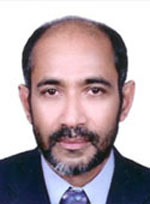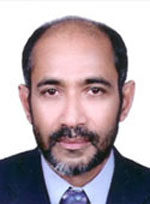


Professor Senarath Dissanayake is an infectious disease scientist with broad research training in immunology and molecular biology. He obtained his Ph.D. degree in immunology in 1975 from the University of London and had the good fortune of training under one of the greatest immunologists of modern times, Professor Ivan M. Roitt, Ph.D., D.Sc, FRCPath, FRS.
Professor Senarath Dissanayake joined the Department of Microbiology, Faculty of Medicine and Health Sciences (FMHS), U.A.E. University, Al Ain, in 1999 as an Associate Professor and was promoted to Professor in March 2003. He takes pride in more than 25 years of teaching and research at the University of Sri Lanka, Peradeniya (1975-1988) and at the School of Public Health, Harvard University, Boston, U.S.A. (1988-1999).
Dissanayake conducts research in three of the most important infectious diseases affecting the world today. These are mycobacterial diseases (tuberculosis and leprosy), lymphatic filariasis and schistosomiasis. His interests range from molecular epidemiology, immunology and immunopathology. serodiagnosis and vaccine development. He has published more than 50 original research articles in peer reviewed international journals.
In recognition of his contribution to infectious diseases research, Professor Dissanayake was elected a Fellow of the Royal Society of Tropical Medicine and Hygiene in 1999 and a Fellow of the Royal College of Pathologists, London, in 2002.
Professor Dissanayake's award winning paper published in the EMJ on tuberculosis transmission is a clinical and molecular study conducted in the UAE. It was funded by Sheikh Hamdan Award for Medical Sciences.
Tuberculosis is a global disease with an estimated 8 million new patients and 2 million dying each year. Although much research has been done, the source of infection in the great majority of patients remains unknown Contradicting the commnonly held view that close contacts (family members) are the major source of infection, Professor Dissanayake argues (see Trans R Soc Trop. Med. Hyg. 2001, 95:591-94; 2004, 98:156-64) that intrafamily transmission of tuberculosis is rare and does not account for the majority of new infections.
The award winning publication by Professor Dissanayake in the EMJ addresses one of the most fundamental questions in tuberculosis transmission and control in the United Arab Emirates. In the U.A.E., the source of tuberculosis transmission is attributed to expatriate workers from tuberculosis endemic countries. Professor Dissanayake has shown that while this view may be correct in many expatriate patients, the same data cannot explain the transmission patterns in U.A.E, national population. By molecular DMA typing using a polymerase chain reaction (PCR) based variation of restriction fragment length polymorphism (RFLP) analysis] of Mycobacterium tuberculosis strains isolated from expatriate and U.A.E. national patients, Professor Dissanayake demonstrates two levels of tuberculosis transmission in the U.A.E. One is the well-acknowledged M. tuberculosis infected expatriate worker (imported tuberculosis), which can be controlled by screening of expatriates.
As the DNA data in the above publication show, a second level of transmission occurs in the U.A.E. population with M tuberculosis strains that are unique and indigenous to the region or the country. This article contends that the latter mode of transmission is more important in the U.A.E. national population and cannot be eliminated by screening of expatriate workers as the current control programmes attempt. Professor Dissanayake concludes that anti-tuberculosis control programmes of the U.A.E. must be aimed at both routes of transmission, with more emphasis on strains that are indgenous to the U.A.E. if the country is to become tuberculosis free.
Professor Senarath Dissanayake is awarded for his original article published in the Emirates Medical Journal from inside UAE for the year 2003-2004